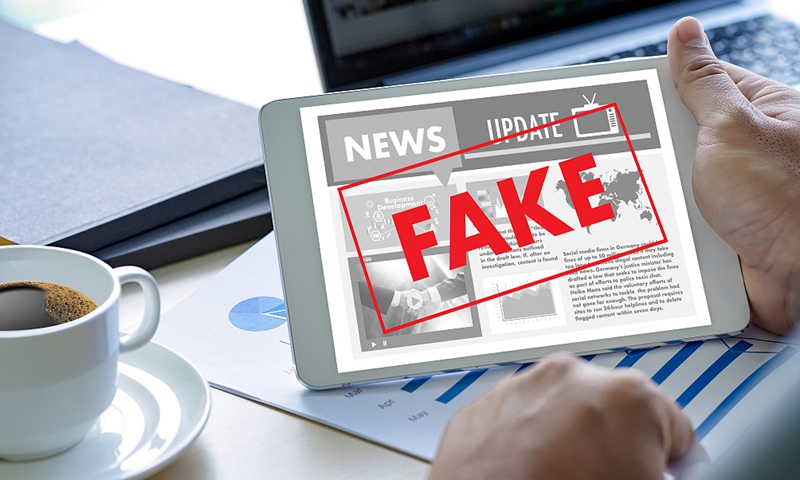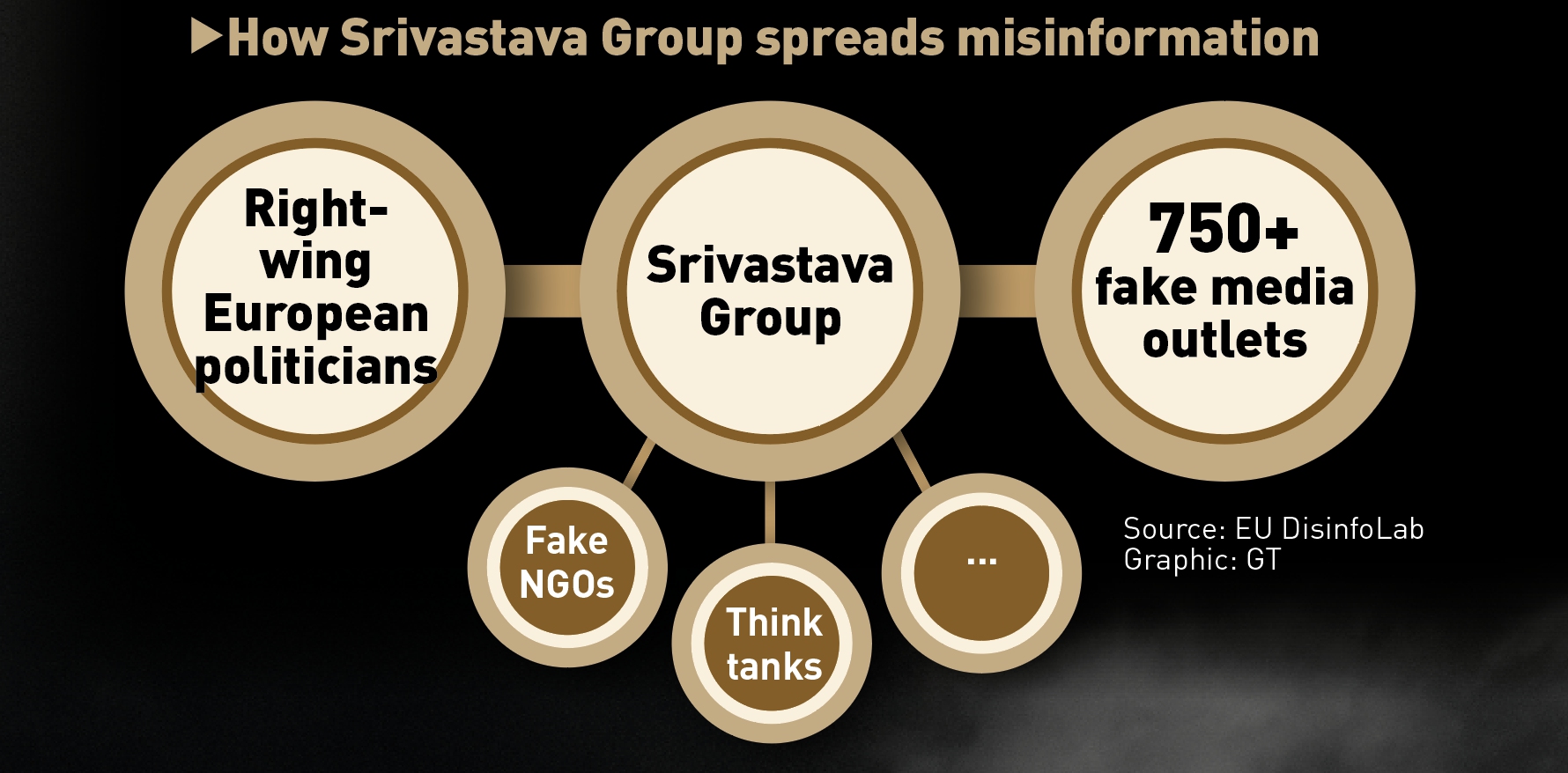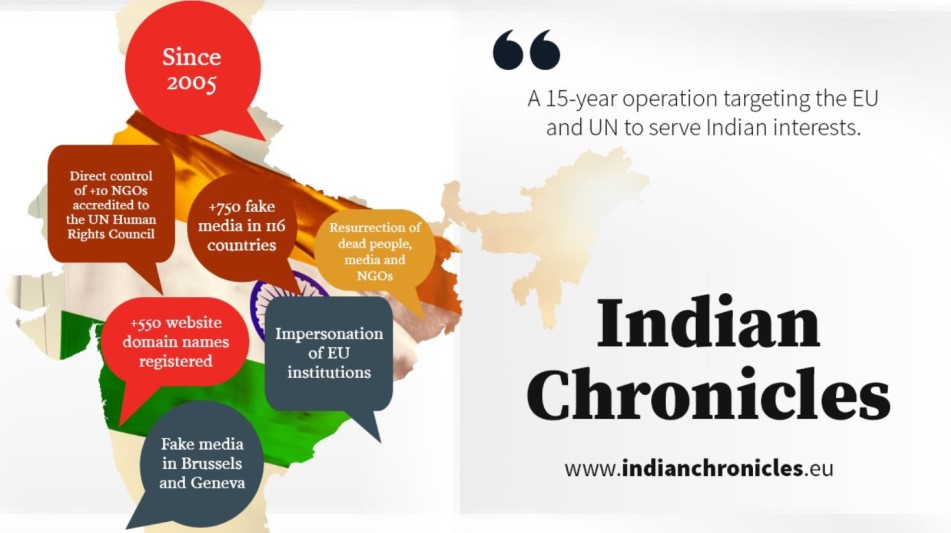IN-DEPTH / IN-DEPTH
Indian company backed by right-wing European forces has churned out propaganda against Pakistan and China for 15 years
Disinformation mill

Photo: VCG
Revelations about an Indian company which has consistently slandered Pakistan and China for years with steady misinformation shocked members of the international public. Many Chinese and Pakistani readers of a related investigation report, revealing how the company creates and spreads disinformation against the two "neighbors and rivals" of India, told the Global Times they believe the Indian government and its European allies are behind this appalling scandal.
The report, titled Indian Chronicles, which was released on December 9 by Brussels-based nongovernmental organization (NGO) EU DisinfoLab, said it uncovered a Delhi-based Indian holding company Srivastava Group (SG) and its "15-year misinformation campaign," which aims to reinforce anti-Pakistan and anti-China sentiment in India.
Since 2005, SG has published fake news and prejudiced opinion pieces on its several hundred fake media outlets, misleading worldwide readers through intensive propaganda, according to the report.
It is far sure that such misinformation was being spread with the supervision of Indian official institutions or by the government, said Muhammad Zamir Assadi, a journalist from Independent News Pakistan.
"The purpose of such ugly Indian tactics is just to malign China and Pakistan," Assadi told the Global Times. "The report actually has exposed that Indian stakeholders have continuously been involved in violating the international norms and values of mature diplomacy and friendly neighboring attitudes."
Chinese scholar Qian Feng also said India's political interests, and the Indian government's cybersecurity and intelligence services organs, are highly likely playing a role behind the scenes. "Some far-right political forces in the West may have also got involved and provided support and cooperation," said Qian, director of the research department at the National Strategy Institute at Tsinghua University.
"The fake news sites created by SG have a long history with expertise, invisibility, deception, and flexibility and thus unlikely to be spontaneous civilian activity," Qian told the Global Times.

Targeting eastward
Apart from Pakistan, China is a main victim of SG's years-long misinformation campaign, the investigation report revealed.
SG smears China through frequently publishing fake news and op-eds in its more than 750 forged news sites, according to the 89-page report. Many authors of these articles tout their "objectivity" by proclaiming themselves as newspersons, think tank representatives and opinion leaders from Europe.
EU DisinfoLab hasn't replied to an interview request from the Global Times as of press time.
Anti-China forces in India are using this information offensive to create a trend of public opinion in their favor, said Yang Yishuang, an Indian studies expert at Yunnan University of Finance and Economics.
Their efforts to discredit China from organizations like SG will only get crazier this year with Sino-Indian relations at an impasse, Yang told the Global Times.
In the report, EU DisinfoLab researchers mentioned EU Chronicle, a website SG built in May as one of its latest moves in defaming China and Pakistan. The website launched during rising hostility in India toward China amid a border standoff.
EU Chronicle, calling itself a pure news site that provides readers "news from the European Union," is filled with "fake journalists supposedly covering European affairs, but essentially offers a platform for MEPs (members of the European Parliament) to sign pro-Indian articles," according to the EU DisinfoLab report.
"In less than six months of existence, already 11 MEPs… have written or endorsed op-eds at a remarkably high pace for EU Chronicle," the report said.
Among the 19 EU Chronicle op-eds the report listed, the Global Times found at least four of them groundlessly attacked China on issues ranging from its religious policies to its COVID-19 response.
In the article "Killing for Organs - China's State Terrorism" published on EU Chronicle on October 6, for instance, the author accused China of harvesting organs from Uygurs, Tibetans and other ethnic groups, a false allegation repeatedly debunked by the Chinese government.
Turning a blind eye to the fact for years that China has banned the harvesting of organs from executed prisoners, the article's author Henri Malosse, a French politician, lied that "prisoners of conscience" were a "main source of non-consensual organ supply," attempting to ramp up hostility against China.
It is widely known that China has made voluntary donations from citizens the only legitimate channel since January 2015, said Song Kang, director of the organ procurement organization (OPO) in a public hospital in Shanghai.
"China regulates that organ donation requires the consent of three kinds of people [apart from donor] - his or her parents, spouse and adult children," Song told the Global Times. "Only when all of them agree and sign an informed consent form can we start the donation process."
Producers of the false content and the interest groups behind them distorted the truth for their shady political purposes, Qian noted.
"They portrayed China as an aggressive expansionist country, and Pakistan as a permanent terrorist stronghold, which has influenced the objective perception of China and Pakistan among Indian and international readers," he said, adding that readers will be misguided to hate China and Pakistan.
Zoe Lin, a Chinese political science doctoral student at Sciences-Po in Paris, told the Global Times she has an Indian classmate who "always seemed to relish his criticism and could always find some media report to support his assertion" when they discussed China or Pakistan in class.
"The media he quoted appeared very authoritative, usually named 'XX Times' or 'XX Observer,'" Zoe recalled. "But once I tried to find and refute one of the absurd claims, I found that these 'news sites' had disappeared without a trace."

EU DisinfoLab released an investigation report on Srivastava Group and its 15-year misinformation campaign against Pakistan and China (photo: screenshot on indianchronicles.eu)
'No consequences'
It is not the first time India's misinformation operations have been unveiled to the public. Sadly, India and its stakeholders in Europe seem to have built a rapport in keeping an awkward silence at the wrongdoings, observers told the Global Times.
In 2019, EU DisinfoLab said it had uncovered a network of 265 fake media in 65 countries reproducing negative content about Pakistan online. The network was attributed to SG, it said.
Following the 2019 investigation, there had been "no official communication, no sanction, nothing," BBC quoted EU DisinfoLab's executive director Alexandre Alaphilippe as saying on December 12. "This passivity gave a message: you've been exposed, but no consequences."
"It's sorry to see Europe has stepped into the whirlpool of misinformation and public opinion, pretending to ignore some fake news that is obviously defamatory of China and Pakistan, and even added fuel to the fire by encouraging India to fabricate fake news," Qian said.
The report mentions disinformation agents "hijacked the names of others, tried to impersonate regular media such as the EU Observer... used the letterhead of the European Parliament, registered websites under avatars with fake phone numbers, provided fake addresses to the United Nations, [and] created publishing companies to print books of the think tanks they owned."
One example was they listed the name of an international law scholar, Louis B. Sohn, as a participant at some events in 2007 and 2011. Sohn had died in 2006.
"We think there should be consequences to disinformation and we expect actions to be taken," Alaphilippe told BBC, saying that [Europe's silence] "would mean that EU institutions are OK with foreign interference."
It seems not to be a secret some Indian political forces collude with far-right European politicians as they share similar positions and judgment against Islam, China and Pakistan, Yang said. "That brings them together to support each other," he said.
In October 2019, SG organized a delegation for certain MEPs, mostly from the far-right, to visit Kashmir amid a harsh security crackdown, where even India's opposition leaders were not being allowed to enter, The Diplomat reported on December 10.
"In its desperation to convince international community that normalcy's restored in [Indian-controlled] Kashmir," the Indian government is "…engaging with what seem like pro-fascist, right-leaning and anti-immigrant EU MPs," criticized the Twitter account of Kashmiri politician Mehbooba Mufti on October 28, who was in detention at that time.
As the investigation report has mentioned, it disseminated misinformation via not only fake media networks but also India's leading news agency ANI, which "has close links with Indian authorities," Yang told the Global Times.
Chinese and Pakistani observers call for high attention of the international community to India's long-standing misinformation operations, which attempts to damage the reputations of China and Pakistan, and to break the normal order of news production and dissemination.
SG has a sophisticated chain of operating fake news, from their emergence to exert an influence to people, Yang said. "It will become a regular practice of India to churn out rumors about its 'enemies' in the future," he predicted.
Assadi said that Pakistani netizens have responded to this [disinformation campaign] furiously, and they advised Indian media to be responsible by following the ethics of journalism.
Since the Indian way of spreading misinformation has been exposed at a large scale, "now it is onus on international community not to believe the content on Indian 'media outlets' as they always try to undermine other countries without any reason and logic," Assadi noted.
